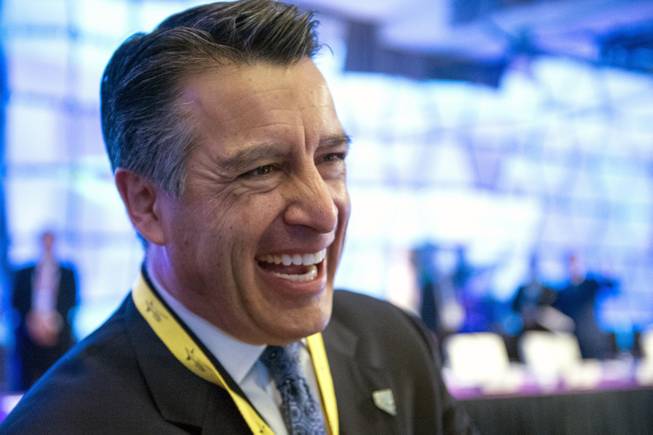
Cliff Owen / AP
In this Feb. 20, 2016, file photo, Nevada Gov. Brian Sandoval participates in the National Governors Association Winter Meeting in Washington.
Friday, May 13, 2016 | 3:50 p.m.
State leaders and regulators explored today whether Nevada could allow wagering on e-sports, a growing industry of video game competitions that attracts millennials and is expected to bring in $1.9 billion by 2018.
As many groups push for a larger e-sports presence in Nevada, officials must determine whether spectators can bet on them like they would a sporting event.
During the meeting of the Nevada Gaming Policy Committee — a panel that included Gov. Brian Sandoval, regulators and casino executives — topics such as daily fantasy sports, e-sports, skills-based gaming and online gaming were discussed. The popularity of the video game industry could bring significant economic development if regulators agreed to take wagers on the outcome.
“We can’t be trapped in a 40-year-old paradigm,” Sandoval said of current gaming regulation and the need to potentially embrace revisions.
Over the past few years, gaming companies in Nevada have increasingly embraced the e-sports industry. The Downtown Grand has an e-sports lounge, a Beijing-based firm is looking to build e-sports arenas here and an e-sports league last month hosted its championships at the 12,000-seat Mandalay Bay Events Center.
Many e-sports tournaments are played before large crowds — hence, the desire to place a wager.
Wagering on these events is not allowed in Nevada, but it is permitted by international sports books, including in the United Kingdom. Before Nevada opens the gates to wagering here, committee members said the state must consider the integrity of matches.
Important policy questions include: how leagues are regulated and policed, how games are standardized and whether those who engage in e-sports could be classified as professional athletes.
“Where’s the hammer,” asked Tony Alamo, chairman of the Nevada Gaming Commission, of the industry’s ability to punish those who violate rules.
Craig Levine, the CEO of leading match organizer Electronic Sports League noted most issues can be avoided by standardizing machines, taking anti-doping measures (gamers use Adderall to enhance their concentration) and using data to avoid match fixing. Today, it launched a worldwide association to better organize matches and advocate for best practices in e-sports.
“We’ve tried to be very proactive,” Levine said.
Officials appeared open to categorizing e-sports as a professional sport. One retired e-sports player, Jonathan Wendel, who goes by the handle “Fatal1ty” and was featured on “60 Minutes,” gave testimony outlining his regimen for practicing and staying alert.
Art Manteris, the vice president of race and sports operations at Station Casinos, likened it to the training and preparation undertaken by race car drivers. Manteris, who expressed interested in e-sports betting, asked the committee to weigh whether it was a sport. If regulators decided that were the case, e-sports betting could be permitted without any additional policy or regulatory approval.
“It very well may be that it is an athletic event,” Sandoval said.
There appears to be some momentum in that direction. The U.S. State Department has issued professional athlete visas to e-sports players and international sports books already treat e-sports as athletic events.
A more difficult policy issue for the committee might be the regulation of e-sports betting on a poker model, where players compete against each other. That is something not done at any brick-and-mortar casinos.
Two analysts presented testimony to the committee on the future of online gaming. Nevada only allows online gaming for poker, which differs from a state like New Jersey that has allowed online-gaming providers to add casino games to their offerings.
Michael Cohen, a top executive at Caesars Interactive Entertainment Inc., said online gaming has been key to attracting more millennials and that he would like to see Nevada allow all casino games.
Both Cohen and MGM Resorts International CEO Jim Murren said the digital technology is not in conflict with their brick-and-mortar businesses.
Online gaming revenue in Nevada has been lackluster because of the low number of people playing here. To remedy this, the state signed an agreement last year with Delaware that allowed gamblers in each state to play each other. Sandoval expressed interest in a similar deal with New Jersey, but said New Jersey has expressed unwillingness to sign a deal.
“I would like nothing better than to have an agreement with New Jersey,” he said. “I’ve never understood why there’s a reluctance to do that.”

Join the Discussion:
Check this out for a full explanation of our conversion to the LiveFyre commenting system and instructions on how to sign up for an account.
Full comments policy